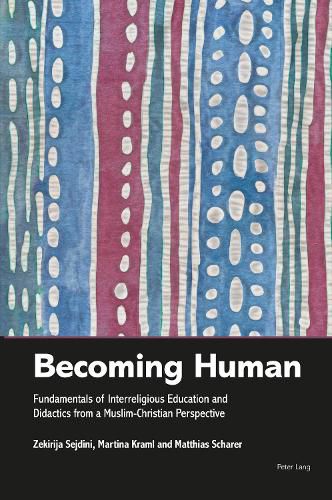Readings Newsletter
Become a Readings Member to make your shopping experience even easier.
Sign in or sign up for free!
You’re not far away from qualifying for FREE standard shipping within Australia
You’ve qualified for FREE standard shipping within Australia
The cart is loading…






This title is printed to order. This book may have been self-published. If so, we cannot guarantee the quality of the content. In the main most books will have gone through the editing process however some may not. We therefore suggest that you be aware of this before ordering this book. If in doubt check either the author or publisher’s details as we are unable to accept any returns unless they are faulty. Please contact us if you have any questions.
Religious and cultural diversity are increasingly visible today. At the same time, increased fear of the other has manifested, particularly of the Islamic religion. Islam today is considered a problematic religion. This attitude yields many challenges in universities and schools, particularly when it comes to religious education. The Institute for Islamic Theology and Religious Education and the Catholic Religious Education Department at the University of Innsbruck are addressing these challenges, having spearheaded a program of intensive cooperation in teacher education - including courses on pedagogy, religious didactics, internships, and evidence-based learning processes in schools and universities.
This research and teaching collaboration lacked an appropriate framework. This book provides a solid basis for interreligious pedagogy and didactics. Authentic interreligious cooperation begins by promoting intra- and inter-religious self-confidence and self-understanding. This required countless discussions among the authors, which yielded distinct viewpoints as well as commonalities. In this way the anthropological starting point for this book emerged and is expanded through a theological perspective on religious education and didactics. Various approaches and attitudes are developed and examined, including contingency sensibility, to support the competent planning, management, and evaluation of educational processes in pluralistic and heterogeneous fields.
$9.00 standard shipping within Australia
FREE standard shipping within Australia for orders over $100.00
Express & International shipping calculated at checkout
This title is printed to order. This book may have been self-published. If so, we cannot guarantee the quality of the content. In the main most books will have gone through the editing process however some may not. We therefore suggest that you be aware of this before ordering this book. If in doubt check either the author or publisher’s details as we are unable to accept any returns unless they are faulty. Please contact us if you have any questions.
Religious and cultural diversity are increasingly visible today. At the same time, increased fear of the other has manifested, particularly of the Islamic religion. Islam today is considered a problematic religion. This attitude yields many challenges in universities and schools, particularly when it comes to religious education. The Institute for Islamic Theology and Religious Education and the Catholic Religious Education Department at the University of Innsbruck are addressing these challenges, having spearheaded a program of intensive cooperation in teacher education - including courses on pedagogy, religious didactics, internships, and evidence-based learning processes in schools and universities.
This research and teaching collaboration lacked an appropriate framework. This book provides a solid basis for interreligious pedagogy and didactics. Authentic interreligious cooperation begins by promoting intra- and inter-religious self-confidence and self-understanding. This required countless discussions among the authors, which yielded distinct viewpoints as well as commonalities. In this way the anthropological starting point for this book emerged and is expanded through a theological perspective on religious education and didactics. Various approaches and attitudes are developed and examined, including contingency sensibility, to support the competent planning, management, and evaluation of educational processes in pluralistic and heterogeneous fields.